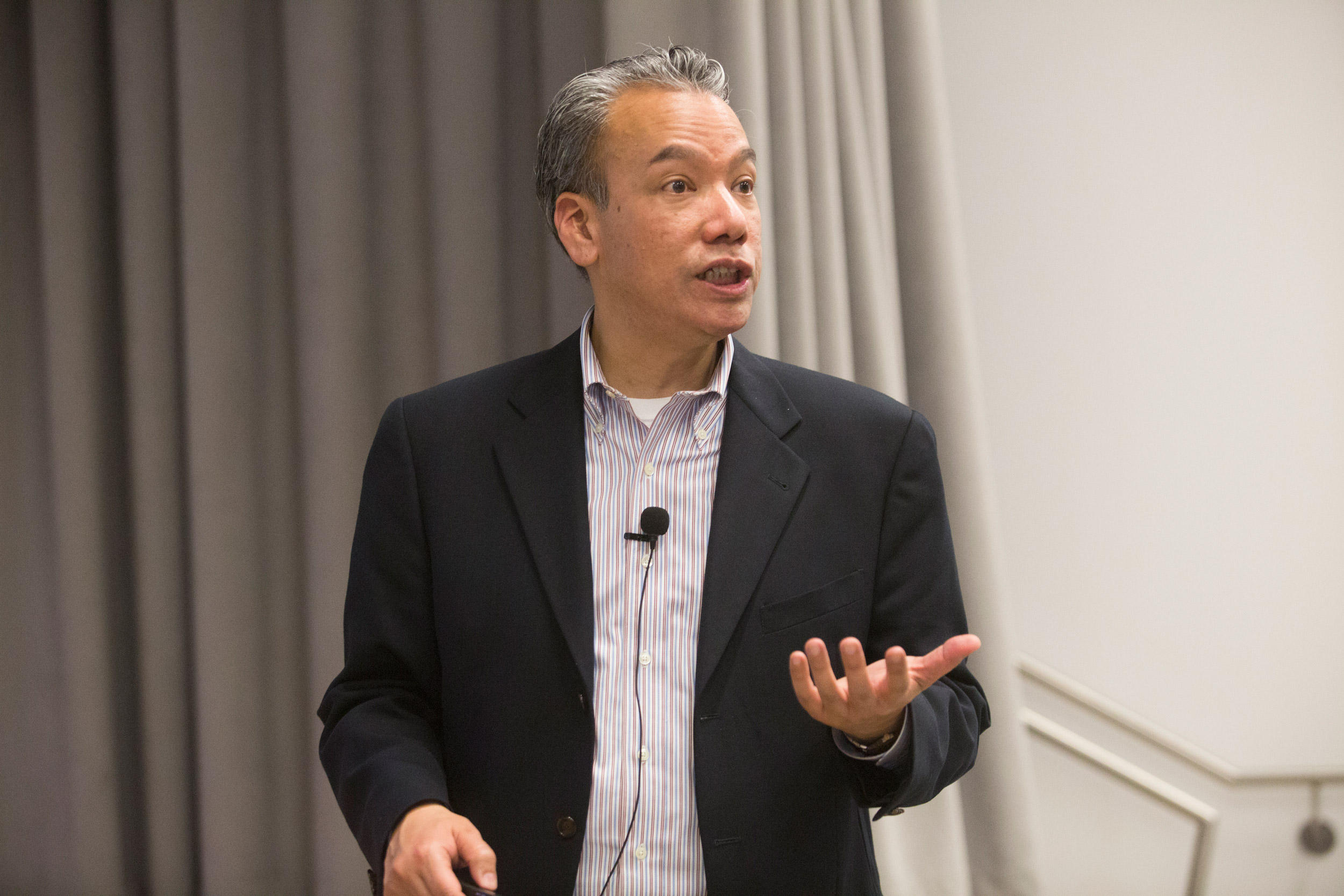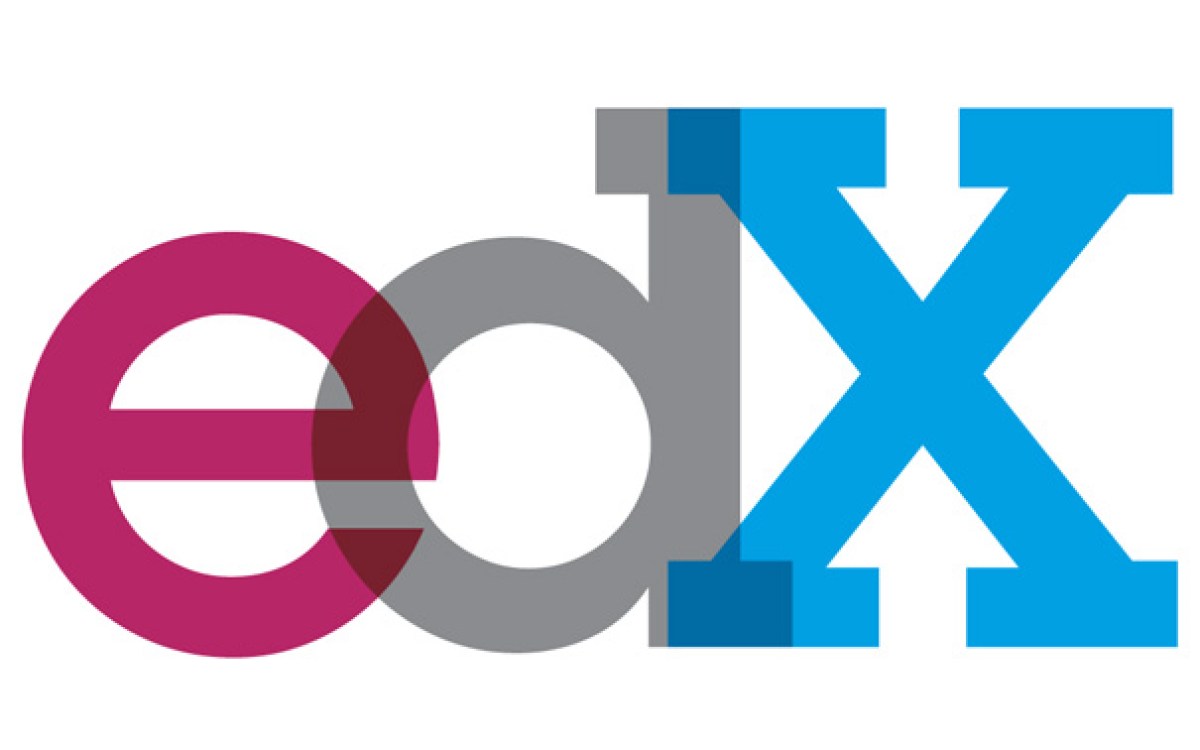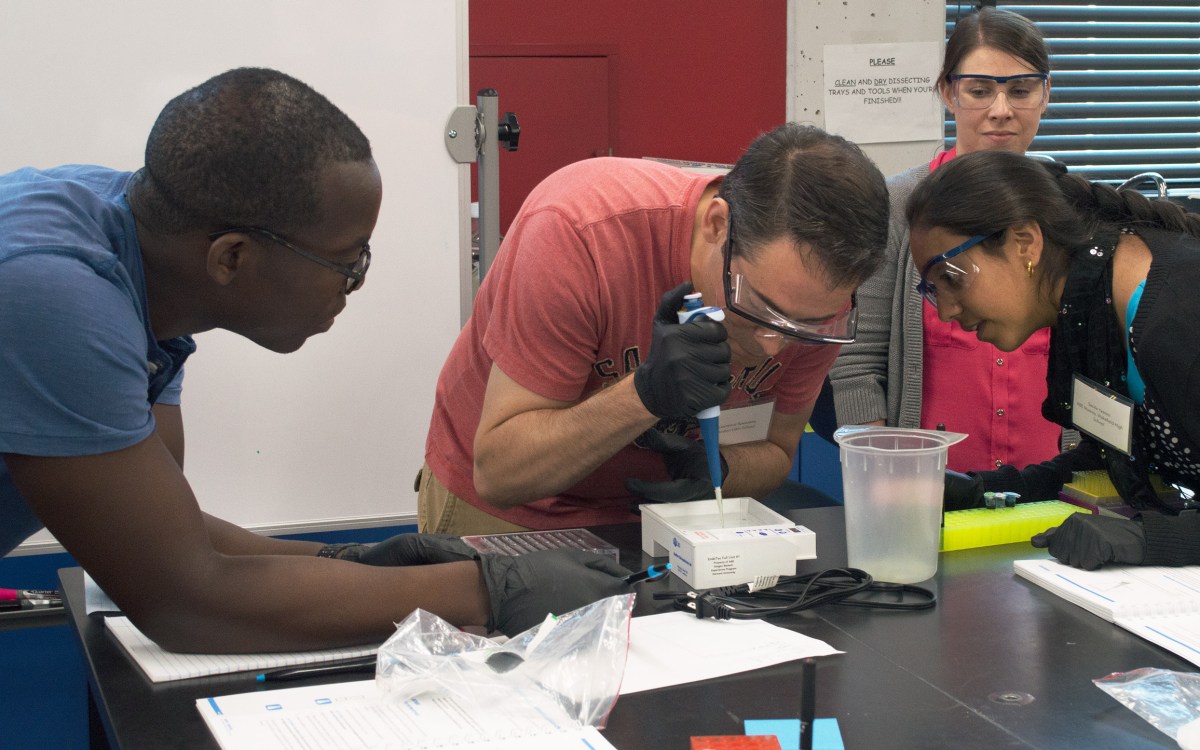
Robert Lue says the science learning platform he’s helping to develop will allow students and instructors to remix, customize, and share lessons.
Jon Chase/Harvard file photo
Easing the way for students to ‘do’ science
Harvard’s Lue explains LabXchange, a new virtual community designed to bring concepts to life
Harvard and the Amgen Foundation have announced a new collaboration to create a free, online, science learning platform for high school and college students.
The effort, called LabXchange, will be developed by a group led by Robert Lue, professor of the practice of molecular and cellular biology, and will create not just a series of virtual laboratory experiences for students, but also tools for instructors to create and remix existing instructional content to provide the related scientific background. It will also create a social media-style community around LabXchange, providing a sharing environment where students can look to their peers, as well as instructors, for advice and support.
LabXchange, funded by a $6.5 million grant from the Amgen Foundation, is expected to launch in about 10 to 12 months.
Lue, who serves as faculty director of HarvardX, Harvard’s arm of the edX online learning platform, spoke with the Gazette about what the plans and hopes are for LabXchange.
Q&A
Robert Lue
GAZETTE: What problem does LabXchange seek to solve?
LUE: The majority of students in high school, and indeed in college, have very little opportunity to experience the scientific process directly. For many students, science is a pile of facts. It’s a pile of things that were done in the past that have to be memorized. They don’t have as much of a chance as we’d like to explore the very process of science, where you build a hypothesis, understand a method, and figure out how to apply a method to an appropriate experimental problem. When learning biology, many students either don’t have access to a lab or, if they do have access to a lab, don’t have the schooling or the preparation to take full advantage of it.
What LabXchange seeks to do is to set up an online learning experience that really exposes them to key aspects of the scientific process, and that gives them a solid background in biology to understand what they’re doing. Then, even if they’re not able to go on into a physical lab, they can have an experience with a virtual experiment that is truly compelling and that gives them a sense of what experimental design and critique is actually all about.
GAZETTE: When I was an undergrad, I had what might be thought of as content courses and then lab courses. My first impression of LabXchange was that this was really focused primarily on providing a lab experience, but it sounds like you’re going to be doing some of the prep for them, so they’ll understand basic principles.
LUE: I’ve spent decades designing very sophisticated labs for large courses in college, and working with high school teachers trying to do the same thing. And quite often the labs that we design for our students are so focused on the experiment succeeding that they become cookbooks. They’re recipes. It’s like a cooking show. The students come in, they have a detailed recipe, they follow it mechanically, and then something comes out at the end, and that’s it. That is not science. At the other end of the spectrum are independent project labs that provide the experience of scientific inquiry but are very costly and impossible to scale.
Science is about understanding what has been done before, but then designing the method, choosing the parameters and the conditions, and then trying it yourself. And if it doesn’t work, you need to be able to troubleshoot it.
The problem with high school labs and college labs is that there’s often not enough time, not enough resources to do that. So LabXchange will provide a very tightly curated set of background materials that get you ready for particular kinds of experiments. Then you can do them virtually. You can do your design, pick your conditions, and run it in a virtual environment and see if it works. And if it doesn’t work, then you can troubleshoot it and try to figure out what you need to alter so that you actually have the iterative experience of experimental design, as opposed to just experimental execution, which is what the majority of labs in both high school and college are about.
“Science is about understanding what has been done before, but then designing the method, choosing the parameters and the conditions, and then trying it yourself. And if it doesn’t work, you need to be able to troubleshoot it.”
GAZETTE: Where are we now with LabXchange? You just announced a big grant from Amgen Foundation. I imagine there’s a lot of development to do.
LUE: LabXchange is quite complex. We talked about virtual experiments, and that’s one part of it, and we’re building that from scratch.
Another part we talked about is the content that preps you in terms of your background and what you need to know. Where that content will come from and how it’s used represents a completely new way to think about the massive open online course content, the MOOC content.
We know that MOOCs are courses. All of the content, be it videos, be it assessments, the diagrams, the questions asked, all of those things are locked into these big online courses. A critical part of LabXchange is a transformation of the core of the Open edX platform such that content in edX and on the edX platform can be completely unbundled and remixed at the will of, let’s say, a high school teacher or a learner.
The idea is to create more flexible learning experiences that are more adaptive. Instead of there being one course on biochemistry, you can actually remix components from several courses on biology, biochemistry, and chemistry to get a shorter, more focused thing that you can use. So, the LabXchange platform will enable a high school teacher to custom remix a course, a background short course, for her class, and register only her students in that course. The idea is to create a much more remixable and customizable learning environment.
So we’re completely changing online courses and the core of the Open edX platform. That process has already begun, and the LabXchange platform being built, that remixing aspect known as the Blockstore, has already started, and that task of re-engineering will take basically 10 to 12 months to complete.
GAZETTE: It sounds like, in order for that to work, all the faculty who are creating courses would have to create them in a way that individual pieces of the course are accessible to being extracted and reused.
LUE: It’s flexible. It can go down to the level of a single lecture video, or even a single problem or quiz assignment. But in terms of the more than 1,500 courses that are on edX now, once the Blockstore architecture is in place — with the permission, of course, of the instructor and his or her School — they can all be remixed once the Blockstore is built.
That’s why it’s such a significant re-engineering of the edX core. It’s going to turn Open edX into a next-generation platform unlike anything else. And, because it’s Open edX, it’s completely open-source and free. What that means is when the re-engineering is done, the 35 million learners who use some version of the Open edX platform will, in principle, have access to this.
“Instead of there being one course on biochemistry, you can actually remix components from several courses on biology, biochemistry, and chemistry to get a shorter, more focused thing that you can use.”
GAZETTE: So this makes it a resource not just for learners, but also for instructors.
LUE: Very much so. What this will allow everyone to do is to remix content and to share it to the world and say, “Know what? I’m trying this combination. It was great for me for this specific purpose; knock yourself out if you’d like to use it.” It’s also a new way of sharing, in the same way that you can share a music or video playlist or something that you love. This will allow you to share something that helped you learn.
As if there is not already a lot going on, the third piece — which is entirely new as well — is basically taking everything we ever learned from social networking, from platforms like Facebook and Twitter and Instagram, and creating a learning community version of it.
LabXchange and Blockstore are the core of the content, which includes lots of content from edX, plus the virtual experiments that we’re building from scratch. We build around that an online community that has all the things that we would expect: You can have profiles, you can follow people, you can share things, you can form groups, you can have discussion groups, you get badges based on your degree of interaction, the amount of stuff you share, how people enjoy and appreciate what you share.
So, the third piece is the social piece, the community piece. The whole thing, in aggregate, is about a new way of reusing and sharing learning content and a new class of virtual experiments. It’s all integrated with a community, a learning community. So it’s like a social network, but in this case it’s a learning network.
GAZETTE: Is LabXchange targeted at flesh-and-blood classes, those having resource issues with this part of learning science?
LUE: There is no question that it will be a major resource for instructors with groups of their own students in the context of a classroom. But imagine if you’re somewhere in the U.S. or anywhere in the world where you don’t even have access to a lab class. You could have an entire online experience in learning the process of science. You don’t have to be part of a class. The idea is that we’re beginning with LabXchange as a powerful resource for college and high school classes, but ultimately it is a powerful virtual resource for everyone.
GAZETTE: What’s the developmental timeline, and is most of the work going to be done here at Harvard, or is it going to be split with Amgen?
LUE: Most of the work will be done at Harvard, but it will involve a large group of user-testers and feedback groups. So, we expect the platform to launch globally in roughly 10 to 12 months. However, during that time, starting with this summer, we’re already having design sprints or design camps with high school teachers, with college instructors, with students. We’ll be going to Amgen scientists for their advice on biotechnology, etc. So there will be prototyping done, and those prototypes will be shared with the collaborative groups that we’re building very rapidly. Over time, there will be an expanding pool, a community of collaborators who are user-testing and giving us feedback.
So if you’re interested in LabXchange, you don’t have to wait 10 to 12 months prior to seeing anything. There will be multiple prototypes that you can actually interact with starting as early as the end of this summer, going into the early fall.
GAZETTE: And edX would be the way you’d get to it?
LUE: We have our own LabXchange.org portal to access the LabXchange, but it will sit on and be integrated with edX.
GAZETTE: Do you see it being a 10-module course or 10-class course? What would the discrete LabXchange experience look like?
LUE: The hope is that eventually when you log into LabXchange, you will literally see scores to hundreds of what we’re calling “pathways.” These are not courses; they’re curated groups of content that users, instructors, researchers have put together for particular uses. You will also be able to query a library of hundreds of carefully made, curated, and moderated pieces of content around biology and biotechnology, many from edX partners.
So there are literally going to be thousands of bits of content and hundreds of pathways. There’ll be thousands of users, users whom you’ll be able to query and say, “OK, I’m a college student who’s just about to start work in a stem cell lab. What can I learn about how to grow stem cells in the lab? Who can I find, in terms of college students, who are working on stem cells or have worked on them in the past? What was their experience? What did they do?”
Imagine if you could access all of that. It allows you to plug into a community of learners who are like you and share common interests, and it allows you to see really what would be a universe of content that you can use to learn what you need to learn to get ready for that lab experience.
The conceptual framework of the LabXchange is focused on biotech and the life sciences, but this can be done for any subject. Because it’s free and open-sourced, LabXchange is the first of what will likely be several Xchanges focused on topics like climate, energy, issues of inequality, and sustainable development.







